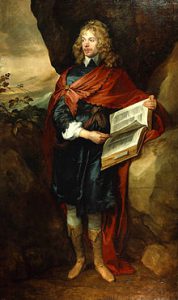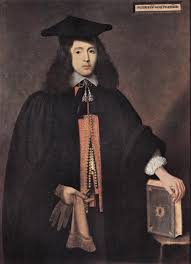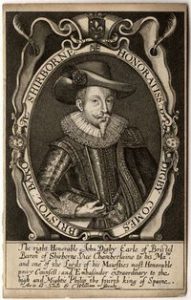The term “Cavalier” poetry refers to a school of English poets during the 17th century while under the rule of King Charles I. The four most well known, or famous, Cavalier poets include Sir Robert Herrick, Thomas Carew, Sir John Suckling, and Richard Lovelace. Poets in this school were referred to as “Cavaliers”, because of their allegiance to King Charles I during the English Civil Wars. Essentially, they were just fancy-pants sycophants. I mean just look at these pretentious assholes.


“Ooooh look at me! I’m holding a book, and wearing a stupid square hat so everyone can know how eloquent and sophisticated I am.” Get over yourselves. Sir John Suckling apparently thinks it’s cool to get a portrait taken of him pretending to read, while I can only assume Richard Lovelace wore his cap and gown on a regular basis to emphasize that he was smarter than everyone else. Suckling, like most other cavalier poets, was not considered to be the most manly of men. Shocking I’m sure. They were the kind of people who believed that the pen was mightier than the sword, which is why it’s safe to say they were not the most feared “cavaliers”. Ironic, considering that cavaliers are suppose to refer to a knight or horseman soldier.
In fact, apparently is 1634, Suckling got his ass beat by another man of nobility, Sir John Digby (pictured below), over a dispute involving a woman whom they both wanted.
Hmmm fancy-pants writer versus a royal advisor who served the king during Civil War. Tough call! Nonetheless, Cavalier poets were considered true gentlemen, and they were brilliant lyricists.
Cavalier poetry is characterized as being different from traditional poetry, in that it wasn’t suppose to be filled with complicated metaphors and complex language that bores and confuses todays AP english and college students. Cavalier poetry instead caters to those who aren’t nearly as smart as the poets themselves. In fact, most of their writing was written for the purpose of impressing and pleasing the King, admiring the duty of the crown. Again, pretentious *cough* suck-ups *cough*. Topics such as religion and philosophy were rarely addressed, and instead their poetry was more focused on expressing the idea of taking satisfaction and enjoying the simpler things in life. Cavalier poetry was written to be witty, eloquently short, and straightforward, centered around ideas of intense beauty, love, nature, and the idea of carpe diem, meaning ‘seize the day’. Cavalier poetry was meant to entertain, not to instruct. It was also known for using a conversational tone, appearing less formal and therefore more easily read.
Below are some examples:
To Daffodils
Fair Daffodils, we weep to see
You haste away so soon;
As yet the early-rising sun
Has not attain’d his noon.
Stay, stay,
Until the hasting day
Has run
But to the even-song;
And, having pray’d together, we
Will go with you along.
We have short time to stay, as you,
We have as short a spring;
As quick a growth to meet decay,
As you, or anything.
We die
As your hours do, and dry
Away,
Like to the summer’s rain;
Or as the pearls of morning’s dew,
Ne’er to be found again.
-Robert Herrick
Love Turned To Hatred
I will not love one minute more, I swear!
No, not a minute! Not a sigh or tear
Thou gett’st from me, or one kind look again,
Though thou shouldst court me to ‘t, and wouldst begin.
I will not think of thee but as men do
Of debts and sins; and then I’ll curse thee too.
For thy sake woman shall be now to me
Less welcome than at midnight ghosts shall be.
I’ll hate so perfectly that it shall be
Treason to love that man that loves a she.
Nay, I will hate the very good, I swear,
That’s in thy sex, because it doth lie there, –
Their very virtue, grace, discourse, and wit,
And all for thee! What, wilt thou love me yet?
-Sir John Suckling
The Spring
Now that the winter’s gone, the earth hath lost
Her snow-white robes, and now no more the frost
Candies the grass, or casts an icy cream
Upon the silver lake or crystal stream;
But the warm sun thaws the benumbed earth,
And makes it tender; gives a sacred birth
To the dead swallow; wakes in hollow tree
The drowsy cuckoo and the humble-bee.
Now do a choir of chirping minstrels bring
In triumph to the world the youthful spring.
The valleys, hills, and woods in rich array
Welcome the coming of the long’d-for May.
Now all things smile; only my love doth lour;
Nor hath the scalding noonday sun the power
To melt that marble ice, which still doth hold
Her heart congeal’d, and makes her pity cold.
The ox, which lately did for shelter fly
Into the stall, doth now securely lie
In open fields; and love no more is made
By the fireside, but in the cooler shade
Amyntas now doth with his Chloris sleep
Under a sycamore, and all things keep
Time with the season; only she doth carry
June in her eyes, in her heart January.
-Thomas Carew
Bibliography
http://www.quotationof.com/bio/richard-lovelace.html
https://en.wikipedia.org/wiki/John_Suckling_(poet)
https://en.wikipedia.org/wiki/Cavalier_poet
Jokinen, Anniina. “Cavalier poets: An introduction.” Luminarium.org. 28 July 2000. Web. 31 Jan. 2017.
The Editors of Encyclopædia Britannica. “Cavalier poet.” Encyclopædia Britannica. Encyclopædia Britannica, inc., 20 July 1998. Web. 31 Jan. 2017.

